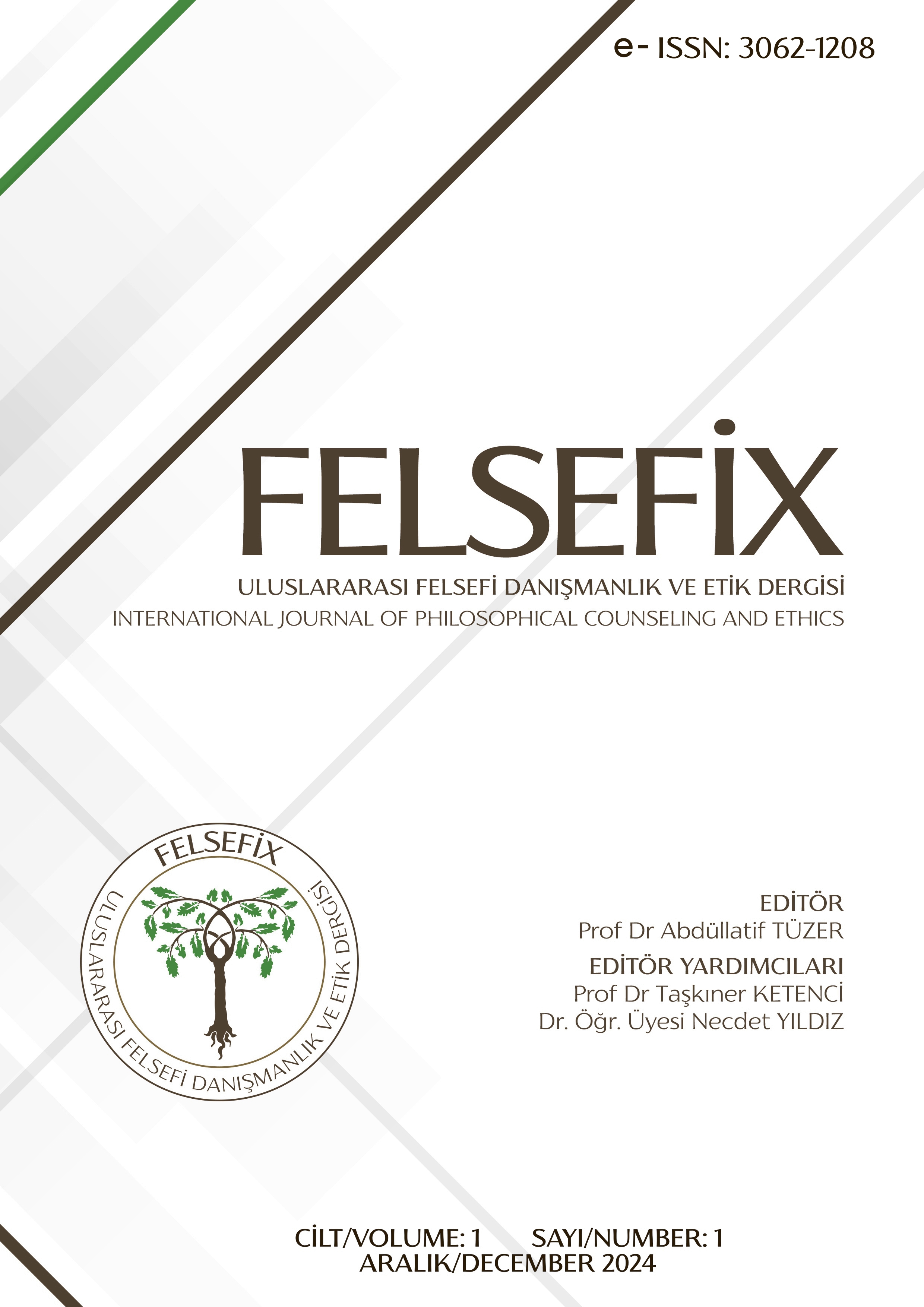Author :
Abstract
Felsefi danışmanlık mahiyeti, metodolojisi ve amaçlarıyla ilgili olarak köklü sorularla boğuşmaktadır. Felsefi danışmanlığın sınırlarını bilmek ve diğer terapi türleriyle ilişkili olarak uygun sınırlar tesis etmek etik ve sorumlu uygulama için aslidir. Bu sınırları belirlemek için önce felsefi danışmanlığın alanını belirlemek ve neyin onun konusu olarak nitelendirilebileceğini tespit etmek gerekir. Felsefi danışmanlık, mevcut problemi net bir biçimde tanımlayarak etkili bir başlangıç yapar ki bu tanımlama danışanın sıkıntısının felsefi araştırmanın alanına girip girmediğinin ayırdına varılmasını gerektirir. Sorun tanımlanınca, danışman ve danışan etkileşimlerinin amaçlarını, bu amaç ister öz-farkındalığın geliştirilmesi ister terapi isterse teselli olsun, işbirliği içerisinde belirlerler. Konu ve arzu edilen sonuçlar belirlendikten sonra, tanımlanan sıkıntıyı etkili bir biçimde ele almak ve belirlenen hedeflere ulaşmak amacıyla çalışmak üzere -Sokratik sorgulama veya düşünce alıştırmalarına benzer – uygun metodolojiyi araştırır ve seçerler. Bu temel sorulara cevap verebilmek için metafelsefeye dalmamız gerekir çünkü felsefenin sınırını ve alanını net bir şekilde belirlemedikçe felsefi danışmanlığın sınırını ve alanını belirleyemeyiz. Aynı şekilde neyin felsefi danışmanlık için bir problem olarak kabul edileceğinin belirlenmesi felsefi problemlerin tanımlanmasına bağlıdır çünkü felsefi problemler felsefenin olduğu kadar felsefi danışmanlığın da konusunu oluşturur. Dahası, felsefi danışmanlığın metodolojisi Sokratik sorgulama, Platoncu diyalektik vb. gibi felsefi bir metot olmalı ya da felsefeye özgü bir tarz olarak felsefenin yöntemlerle iş gören değil de yöntemler üzerine çalışan bir etkinlik oluşunu ifade eden “yöntem ötesi” yaklaşım da olabilir. Son olarak felsefe yapmanın amacına bağlı olarak felsefi danışmanlığın amacı ya terapötik ya da kavramsal açıklık, öz-farkındalık vb. gibi gayri terapötik olabilir. Mesela, Daya Krishna’nın metafelsefesine göre, felsefe öz-düşünümlü bilişsel bir etkinliktir ve kavram oluşumuna ilişkin öz-düşünümlü farkındalıkta, “kafa karışıklığı”, “kuşku”, “uyuşmazlık” veya “eksiklik” olduğunda felsefi problemler doğar. Bu yüzden felsefenin de felsefi danışmanlığın da net bir başlangıç noktası olmalıdır. Dahası, felsefe açıklığı amaçlar – felsefe kuşkuların açıklığa kavuşturulmasıyla yaşar ve açıklığa kavuşturma felsefenin bitimidir. Felsefe problemlerle başlayan ve problemin çözümü ve çözümlenmesiyle sona eren özel bir etkinliktir ki bu, felsefi danışmanlık oturumlarının da sonsuz olamayacağına işaret eder. Felsefi yöntemler ne salt mantıksal ne de salt deneysel olabilirler çünkü felsefi problemler empirik problemlerle mantıksal-matematiksel problemler arasında bir yerde bulunur; ne empirik yöntemlerle ne de mantıksal-matematiksel tümdengelimle çözülebilir. Bu felsefi problemler “olduğu gibi gerçek”ten veya olgusal dünyadan bağımsızdır. Bunlar temelde olgusal meselelerin ikincil bir rol oynadığı argümanlarla ilgilidir. “Olduğu gibi gerçek”i bilme iddiasında olan birisi filozoftan ziyade bir mistiktir. Bir filozofun ilgisi bir gerçeklik olarak Tanrı’dan çok Tanrı kavramıdır. Dolayısıyla bu ayrımlar hem felsefenin hem de felsefi danışmanlığın sınırını veya alanını belirler. Bu yüzden, metafelsefenin felsefi danışmanlığın mahiyeti, metodolojisi, amaçları ve sınırlarına ilişkin temel sorulara, açıklık ve sağlam bir felsefi temel sunmak suretiyle, nasıl cevap verebildiğini anlayabiliriz.
Keywords
Abstract
Philosophical counseling grapples with fundamental questions about its nature, methodology and goals. Recognizing the limitations of philosophical counseling and establishing appropriate boundaries with other forms of therapy is essential for ethical and responsible practice. To determine these boundaries, it is first necessary to determine the province of philosophical counseling and establish what qualifies as its “subject matter”. Philosophical counseling effectively begins by precisely identifying the "problem" at hand, which necessitates discerning whether the client's concerns fall within the purview of philosophical exploration. Once the specific problem is identified, the counsellor and client collaboratively establish the goals of their engagement, whether it's cultivating self-awareness, therapy or consolations. After the subject matter and the desired outcomes are determined, they explore and select appropriate methodologies—such as Socratic questioning or reflective exercises—to effectively address the identified concerns and work towards achieving the established goals. To address these fundamental questions, we have to delve into metaphilosophy because we can’t determine the boundary or province of philosophical counseling unless we have clearly determined the boundary or province of philosophy. Similarly, identification of what counts as a problem for philosophical counseling is contingent on the identification of philosophical problems because philosophical problems constitute the subject matter of philosophy as well as philosophical counseling. Furthermore, the methodology of philosophical counseling should be a philosophical method like Socratic questioning, Platonic dialectics etc. or it may be a “beyond method” approach, reflecting the unique way philosophy operates on methods rather than with them. Finally, the goal of philosophical counseling may be therapeutic or non-therapeutic such as conceptual clarity, self-awareness etc. depending on the goal of philosophizing. For example, according to Daya Krishna’s metaphilosophy, philosophy is a self-reflective cognitive activity, and philosophical problems arise when there is “confusion”, “doubt”, “incompatibility” or “incompleteness”, in the self-reflective awareness of concept formation. Thus, philosophy as well as philosophical counseling have a definite starting point. Furthermore, philosophy aims at clarity—philosophy lives in the clarification of its doubts and clarification is the death of philosophy. Philosophy is an occasional activity that begins with philosophical problems and ends when the problem is solved or resolved, indicating that philosophical counseling sessions, too, cannot be endless. Philosophical methods can neither be purely logical nor empirical because philosophical problems exist in the space between empirical problems and logico-mathematical problems; neither can be solved through empirical methods nor logical-mathematical deduction. These philosophical problems are independent of “really real” or the factual world; they are primarily concerned with arguments with factual issues playing a subsidiary role. Anyone who claims to know the “really real” is a mystic rather than a philosopher. A philosopher’s concern is the concept of God rather than God as a reality. Hence, these distinctions determine the boundary or province of both philosophy and philosophical counseling. Thus, we can see how metaphilosophy can respond to the fundamental questions about nature, methodology, goals and limitations of philosophical counseling by providing clarity and a solid philosophical foundation.





